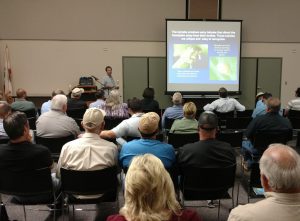Several dozen industry members were on hand for the Spring Citrus Meeting that was held last week at the Tulare County Agricultural Building. The event touched on several of the major issues that growers are concerned with, along with presentations on best practices for managing citrus trees. The day began with important information related to Asian citrus psyllid (ACP) and the disease it causes Huanglongbing (HLB) which has been growing at an alarming rate in Southern California in the past few years.
 “It’s definitely exploded,” said UC Cooperative Extension (UCCE) Citrus Advisor for Tulare, Fresno and Madera Counties Greg Douhan, “there’s been approximately 600 or so, it changes every day, finds in the greater Los Angeles area. I believe a year ago it was maybe 100 and the year before that it was 20, 30, 40.”
“It’s definitely exploded,” said UC Cooperative Extension (UCCE) Citrus Advisor for Tulare, Fresno and Madera Counties Greg Douhan, “there’s been approximately 600 or so, it changes every day, finds in the greater Los Angeles area. I believe a year ago it was maybe 100 and the year before that it was 20, 30, 40.”
The increasing occurrence of HLB in citrus trees was an alarming point discussed at the meeting, however, there was some good news related to ACP. Prior to a focused effort related to the movement of citrus, several ACP finds were happening in different portions of the San Joaquin Valley. Quarantine efforts and increased public awareness seem to have helped reduce the number of psyllids being discovered. “CDFA finds it on these traps, but they find one insect here, another one there, they’re not finding that many live populations of the insect. So, it is sporadic, and it seems to be moving along corridors, so it’s probably being moved with people,” noted Douhan.
UCCE Citrus and Pistachio Farm Advisor for Kern County, Craig Kallsen also presented information on a couple of older research projects that remain relevant to the industry regarding orchard spacing and pruning methods. Kallsen referenced the study showing overall yield per acre is less over time with higher density orchards. Another project Kallsen spoke on showed that hand pruning did not increase the number of fruit in the tree, nor did taller trees have any notable difference in yield or quality compared to shorter trees.
Nematodes were discussed at length during the Spring Citrus Meeting with information presented on the life cycle of nematodes and what kind of damage they can cause in agricultural operations. Management techniques and effective nematicide usage information was also provided. Attendees also gained information on different pathogens that pose a risk to the California citrus industry.
Listen to Douhan’s interview below.










